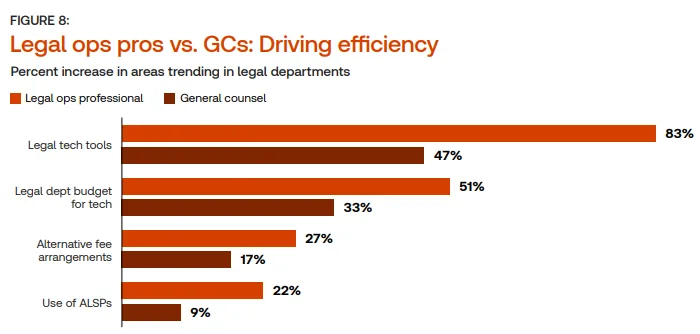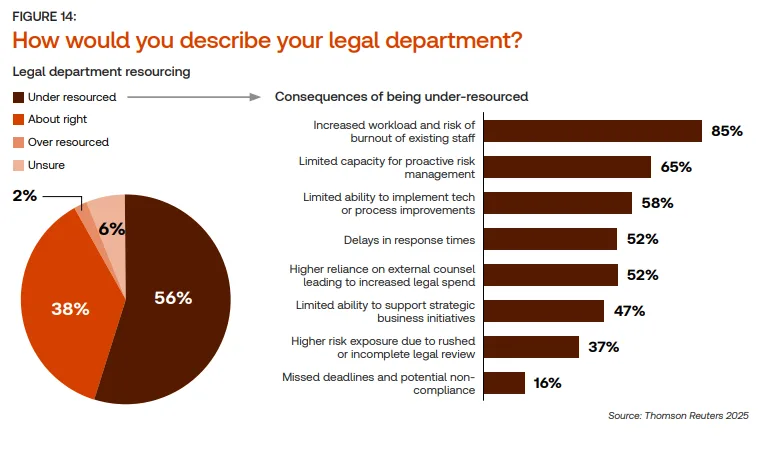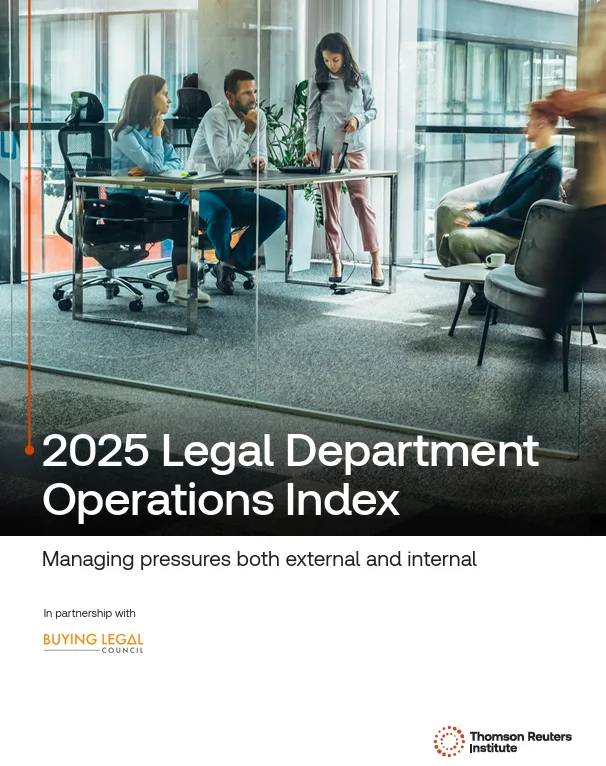From cost control to value creation
Highlights
- The legal operations function has evolved from a cost-control measure to a strategic driver of value, with 82% of legal departments now having dedicated roles that significantly outperform general counsel-managed functions in technology adoption, data analytics, and use of alternative providers.
- Successful legal operations teams leverage AI-powered analytics for proactive, predictive decision-making, moving beyond simple spend tracking to forecast budgets, optimize vendor performance based on outcomes, and predict matter results, marking a significant shift toward strategic maturity.
- To prove their value and combat being under-resourced, leading legal ops professionals demonstrate ROI by spearheading strategic AI adoption with clear governance, modernizing outside counsel management with data-driven insights, and positioning the department as a business enabler to executive leadership.
The 2025 Legal Department Operations Index showcases how, more than just surviving this pressure, legal operations professionals are using it to create measurable organizational value.
The data show a fundamental shift in corporate legal operations: 82% of legal departments now have at least one dedicated legal operations role. This transition is about more than adding headcount — it’s about recognizing legal departments’ strategic organizational role.
Jump to ↓
Practical AI implementation framework
The evolution beyond cost cutting
Intelligent analytics drive measurable savings
Strategic technology leadership
Modernizing outside counsel relationships
Demonstrating ROI to leadership
The evolution beyond cost cutting
Legal operations began primarily as a cost-control function, but today’s reality is far more sophisticated. It’s expanded to become “the strategic and operational engine of our legal department — driving efficiency, innovation, and alignment with enterprise goals” according to one professional. “We lead initiatives in technology adoption, process improvement, and data analytics to optimize legal service delivery.”
Our research highlights measurable operational advantages to installing specialized legal operations leadership. When dedicated professionals, rather than general counsel, manage these functions, departments exhibit:
- Higher adoption rates of legal technology (83% vs. 47%)
- More sophisticated spend management through data analytics (63% vs. 29%)
- Greater utilization of alternative legal service providers (ALSPs) (24% vs. 3%)
- More strategic implementation of alternative fee arrangements (AFAs) (27% vs. 17%)

Intelligent analytics drive measurable savings
While many departments continue to solely track spend, the most successful legal operations teams now practice predictive, analytics-driven decision-making. Our research shows that 80% of legal operations professionals use more efficient processes, while 73% use technology automation to drive savings.
But the real differentiator lies in how legal operations professionals use data. Nearly two-thirds of them use it to identify cost-saving opportunities, compared to less than one-third of operations functions managed by general counsel. This proactive cost management enabled by AI-powered analytics helps legal operations professionals forecast spend patterns and identify optimization opportunities before they impact budgets.
It also supports intelligent vendor management through advanced analytics that enable more sophisticated evaluation of law firm performance. This evaluation moves beyond simple cost comparisons to outcome-based assessments that drive better value.
Additionally, predictive matter outcomes become possible when historical data combined with AI capabilities allows legal operations teams to forecast case results and costs, enabling more strategic resource allocation. The shift from reactive cost control to proactive strategic planning marks a significant advancement in legal operations maturity.
Strategic technology leadership
Legal operations professionals consistently outpace their general counsel counterparts in technology adoption. However, the report data reveal a concerning trend: while departments are adopting technology solutions, many rank them as underused, rather than as valuable.
The most successful legal operations teams are addressing AI underuse by establishing clear AI governance frameworks. With 44% of legal departments that are selecting law firms considering their “use of appropriate technology” and 33% considering “transparency in AI use,” legal operations professionals are setting the standard for responsible AI adoption.
They’re also implementing systematic return on investment (ROI) measurement approaches. Instead of simply deploying technology, leading legal operations teams track and demonstrate AI value through metrics including cost reduction, efficiency gains, and improved decision-making speed. And they’re creating practical implementation roadmaps for phased AI integration, including steps from readiness assessment to pilot programs and scaled optimization.
Practical AI implementation framework:
- Phase 1: AI readiness assessment — Evaluate current technology use, assess AI maturity against benchmarks, and establish baseline metrics for measuring future impact.
- Phase 2: Pilot program development — Launch targeted AI pilots in high-impact areas while establishing governance policies that align with transparency requirements for responsible AI use.
- Phase 3: Scale and optimization — Expand successful implementations, integrate with existing systems, provide training for adoption, and track quantifiable outcomes through real-time dashboards.
- Phase 4: Advanced AI integration and innovation — Achieve full AI maturity through predictive analytics, AI-driven vendor management, and positioning legal operations as the organization’s AI innovation leader.
Modernizing outside counsel relationships
Although the rates for ALSPs and AFAs have remained steady for years, dedicated legal operations professionals are making progress. However, meaningful change requires dedicated time and attention from these professionals.
Leading legal operations teams are optimizing outside counsel management with AI-driven firm selection. By using data analytics, they evaluate firm performance beyond traditional metrics, incorporating cost efficiency and outcome prediction into selection criteria.
They’re also implementing strategic panel management, moving from matter-by-matter selection to AI-optimized panel composition that considers historical performance, specialization, and cost effectiveness. Performance benchmarking has become automated through tracking and analysis of outside counsel performance metrics, enabling data-driven decisions about firm relationships. The 24% of legal operations professionals using ALSPs compared to just 3% of general counsel demonstrates the impact of dedicated focus on alternative service delivery.
Demonstrating ROI to leadership
Perhaps the most critical challenge facing legal operations professionals is communicating value to C-suite executives. With 56% of legal departments reporting being under-resourced, demonstrating ROI is existential.

The most successful legal operations professionals position themselves as business enablers rather than cost centers by focusing on metrics that resonate with executive leadership. They emphasize AI-driven business enablement by demonstrating how AI helps under-resourced departments achieve more with existing resources, directly addressing the “do more with less” mandate.
They present quantifiable outcomes with clear metrics around cost reduction through automation, efficiency gains in matter management, improved decision-making speed, and enhanced risk prediction. They also focus on future-proofing capabilities by positioning legal operations as the AI innovation leader within legal departments, preparing for continued technological evolution.
The data show that 70% of legal operations professionals expect generative AI to influence stakeholder interactions, fundamentally changing how they demonstrate value to business leaders.
Strategic planning
The 2025 Legal Department Operations Index highlights a profession in transition. Legal operations has evolved from a support function to the operational and strategic backbone of modern legal departments. As one professional observed:
“The role of legal operations is to take the everyday operational tasks off the attorney’s desk so they can focus on the specialized work they were hired to do.”
This shift requires legal operations professionals to master a complex balance: driving efficiency while enhancing service quality, controlling costs while enabling business growth, and implementing technology while ensuring adoption and value realization.
The organizations that will thrive are those that recognize legal operations not as an administrative necessity, but as a strategic advantage. The data demonstrate that dedicated legal operations leadership delivers measurable value across every dimension of legal department performance.
The next step in making the case for legal operations lies in connecting operational excellence to business outcomes. As corporate legal departments continue navigating external and internal pressures, legal operations professionals who can demonstrate this connection will position themselves, and their organizations, for sustained success.
Ready to advance your legal operations strategy? Explore The evolution of legal operations: How corporate legal departments can stay ahead of the curve for additional insights on building operational excellence in your department.













